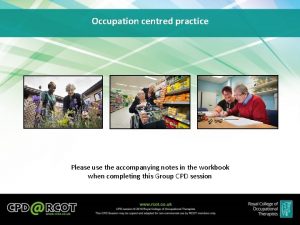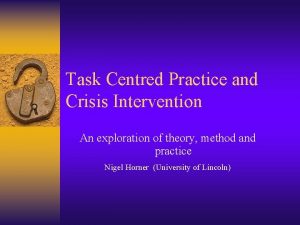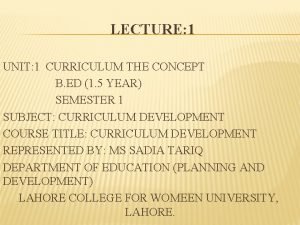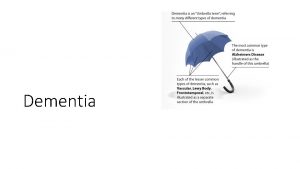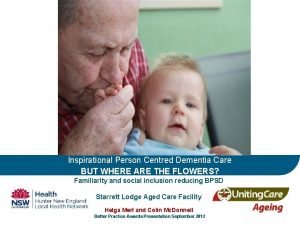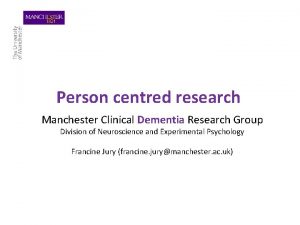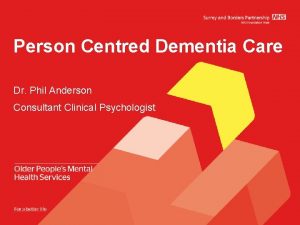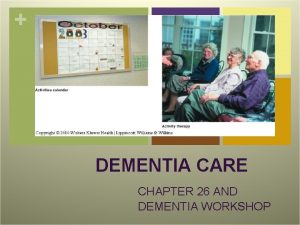PERSON CENTRED SUPPORT FOR PEOPLE LIVING WITH DEMENTIA
















- Slides: 16

PERSON CENTRED SUPPORT FOR PEOPLE LIVING WITH DEMENTIA Core values, communication and intervention strategies PRESENTATION BY OLAYINKA AJOMALE, MSW. EXE DIR- CENTRE ON AGEING, DEV & RIGHTS OF OLDER PERSONS (CADROP) AT IBADAN BUSINESS SCHOOL, IBADAN ON 26 TH NOVEMBER , 2020. Organized by Brain Health Initiative Nigeria in conjunction with Oyo State Local Government Service Commission.

OUTLINE. v BACKGROUND – Dementia v DEMOGRAPHICS v PERSON CENTRED CARE v- Background v- Current understanding v- Core values v- Elements v- principles of communication v- Tips v Challenges & Recommendation v CONCLUSION

BACKGROUND - Dementia • • • Not normal ageing, not a disease, set of symptoms Global Health issue, Not witchcraft, misconceptions & myths Physical, psychological, socioeconomic impact severe on all Loss of memory, language, problem solving skills, thinking ability, all affect daily life ADL Common more with women, the older the likely Causes enormous stress on carers, spouses & family Abuse and discrimination common on PLWD Massive, capital intensive research, no breakthrough Awareness & advocacy needed and significant No cure, best show affection, care & attention

Demographics • 1 new case every 3 sec WHO • 46 m in 2020, 131 m in 2050. • Heavy financial burden – Globally US$818 billion. AA 2018


DEFINITIONS OF PERSON CENTRED CARE • ……value based commitment to support PLWD • . . . . ideas and methods of working (caring)that emphasize communication and relationship with the PLWD- Prof Tim Kitwood • ………care built on the needs of an individual, knowing the uniqueness of the person through interpersonal interaction/relationship. The total care of the person, • ………ways of thinking and doing things that sees PLWD using health and social services as equal partners in planning, developing and monitoring care to ensure it meets their needs. • Other names – person directed, resident focused

Person Centred Care • Professor Tim Kitwood, Father of modern day person centred dementia care created a new approach to dementia care REMENTIA (Recovery) • - right attitude, improvement in moods, quality of life of PLWD all improves the cognitive abilities • - right positive, loving social environment PLWD will improve, restore self care abilities, achieve optimal independence • Beliefs, Relationships, Skills, Identity, Involvement • Shift focus: disease to person, health model to social care, supports social and emotional needs, restore value to PLWD, • Supports effective methods of interpreting behavioral expressions

CORE VALUES OF PCC • • • Individuality Independence Privacy Choices & Options Dignity Respects Non-judgmental Show empathy Partnership RIGHTS – PLWD have rights.

KEYS ELEMENTS • Treat with dignity, respect and compassion • Understanding their history and personal attributes • Know their lifestyle, culture and preferences • Identify their likes, dislikes, hobbies, interest • Observing situations from their point of view • Personized, coordinated care support & treatment • PCC supports the use and retaining of skills and abilities • Listening with empathy

PCC & Communication • Important – recognizes individual • Giver – receiver – feedback • Verbal or non verbal • Profound effect on quality of life & care • Poor communication – anxiety, depression • positive, supportive communication very essential • Allows for correct understanding of the perspective of issues of PLWD

PCC & COMMUNICATION - Tips • One on one conversation in quiet places • Speak slowly and clearly • Maintain eye contact • Allow ample time to think to respond, • Sacrifice good time • Exercise patience, reassure, be persuasive • Ask one question at a time • Allow for choices – give options • Reframe questions, instead of repeating • Be innovative, jovial, proactive,

PCC & COMMUNICATION cont’d IN COMMUNICATION – • 7% of words are used • 38% represent the voice in saying the words • 55% is by body language • 93% is not the word spoken • Conveys our - likes & dislikes -power & authority - acceptance & rejection

RECOMMENDATION & CONCLUSION • • • Declare dementia global health issue Encourage person centred care Intensify awareness & education on the issue Create intervention strategies on modifiable risk factors Massive enlightenment, dementia is not witchcraft Massive investments in health and social care Assistance to caregivers & family members Intensify momentum on research on dementia/PCC Legislate against discrimination & abuse

END QUOTE The biggest gift we can give the person living with dementia, ourselves as carers and the relationship we have established is to accept the PLWD for who he/she is.

THANK YOU VERY MUCH FOR LISTENING

 Care certificate 5
Care certificate 5 Health change methodology
Health change methodology Wales safeguarding procedures
Wales safeguarding procedures Existentialism examples
Existentialism examples Person-centred approach
Person-centred approach Who traditional medicine strategy 2014-2023
Who traditional medicine strategy 2014-2023 People centred implementation
People centred implementation Living well with dementia scotland
Living well with dementia scotland 2 person singular
2 person singular Examples of 2nd person point of view
Examples of 2nd person point of view Person person = new person()
Person person = new person() Example of personal pronoun
Example of personal pronoun Occupation centred practice
Occupation centred practice Trait centred view of motivation
Trait centred view of motivation Task centred approach
Task centred approach Activity centred curriculum
Activity centred curriculum Reliability centred maintenance principles ppt
Reliability centred maintenance principles ppt












